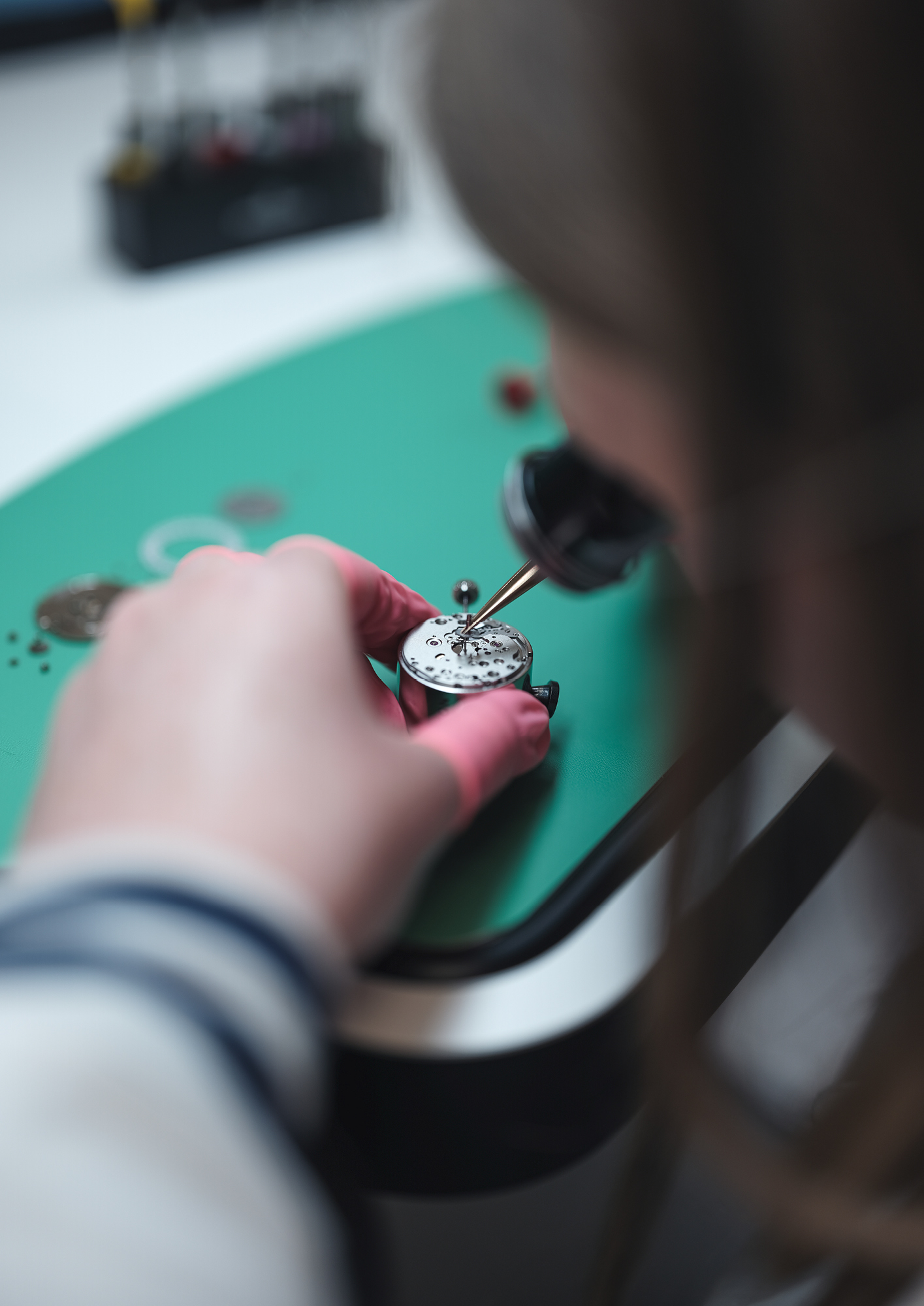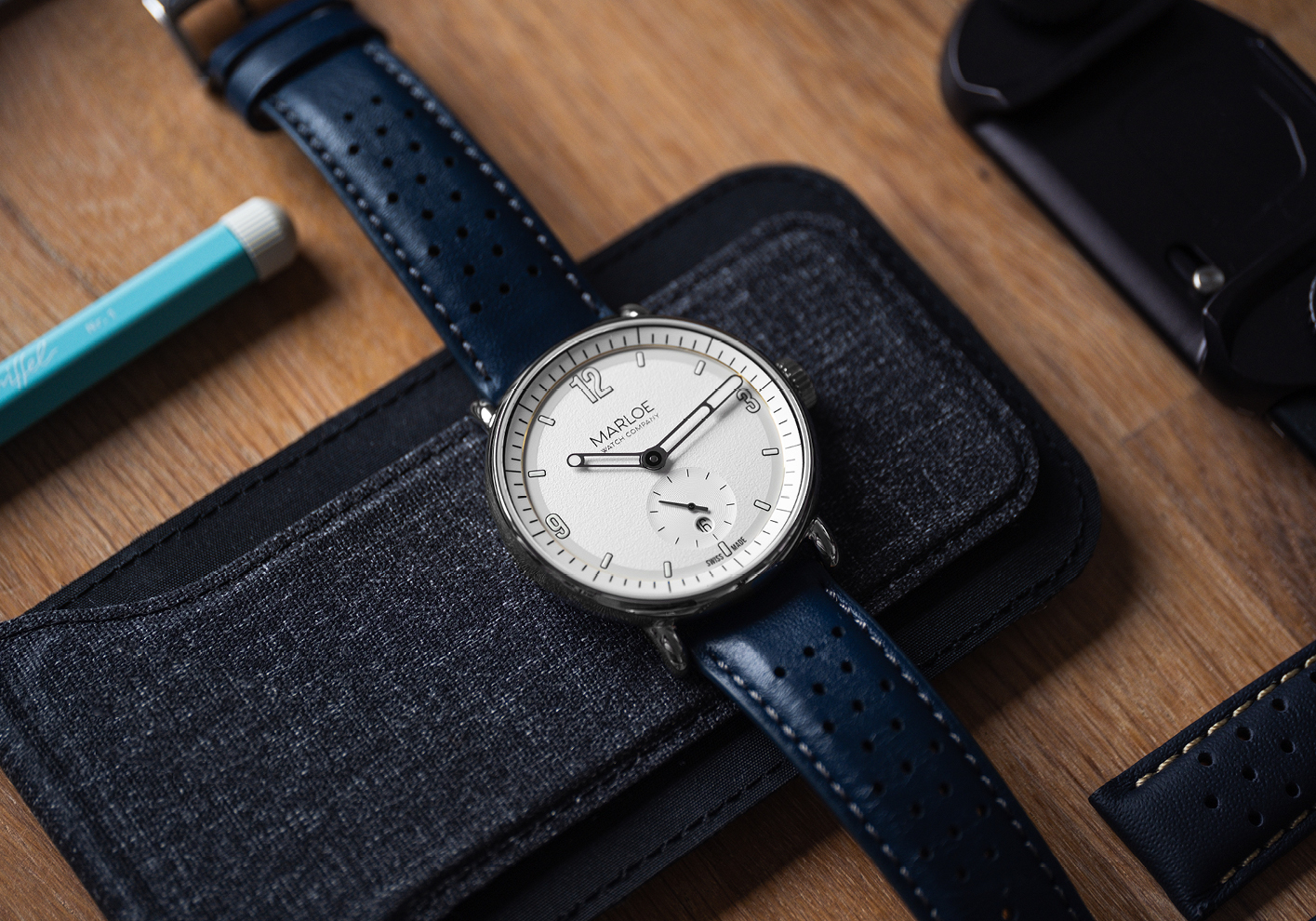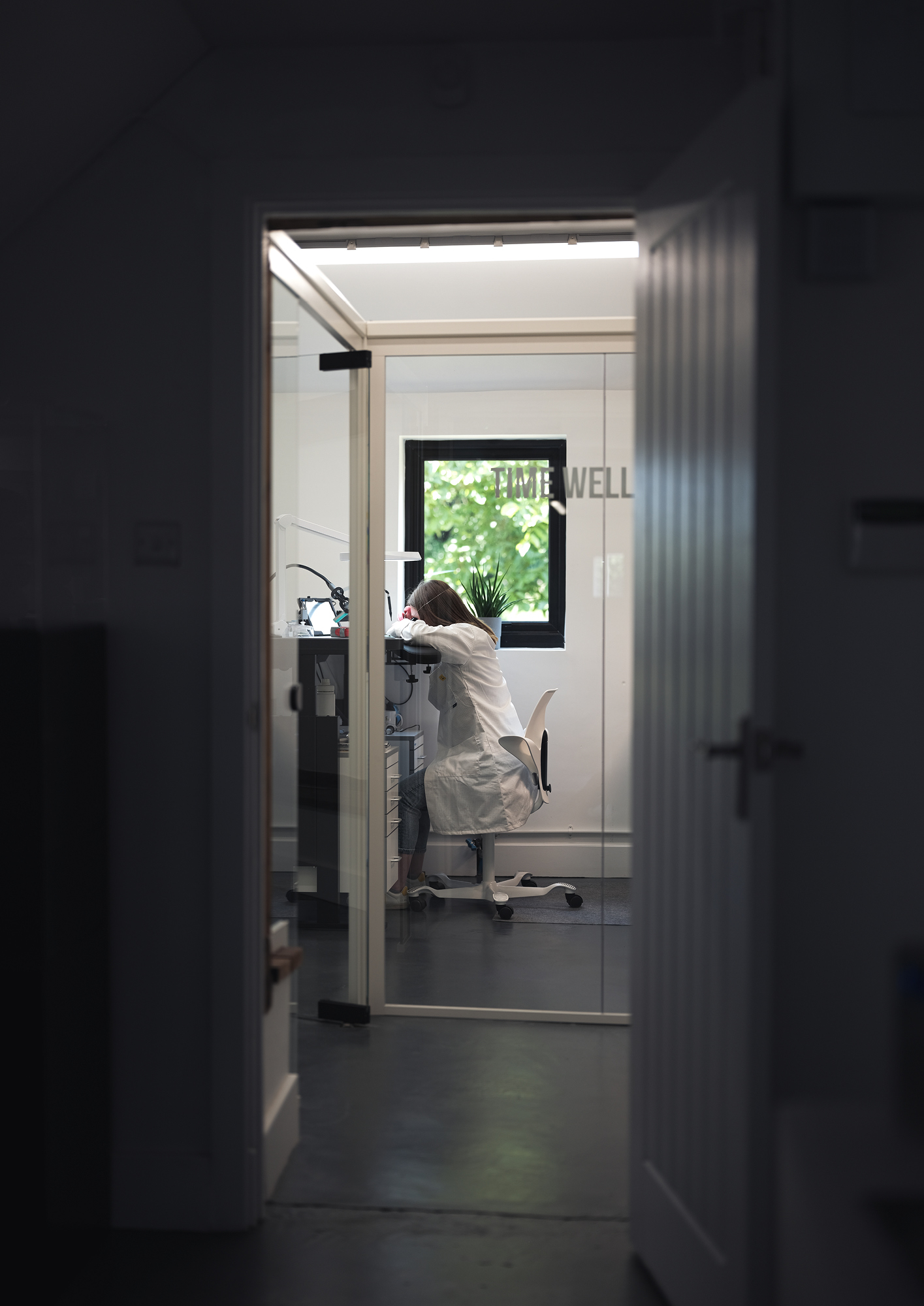WORDS
Imogen Almond
Can you tell us a bit about your background and education? How did you get into the world of horology?
I’m from Stoke-on-Trent originally. My dad’s a joiner and my mum’s a nurse and a brilliant painter and pianist, so we’ve always had some kind of creativity in the household. I was always really interested in jewellery but wanted to keep my options somewhat open so when it came to going to university, I did a multidisciplinary arts course down in Falmouth, Cornwall. The course involved ceramics, glasswork and metalwork.
Once I graduated, I landed a job at Gap and Superdry (where I met my partner, whose dad is a watchmaker) as a visual merchandiser. After realising visual merchandising wasn’t for me, a job came up at an established jewellers and I joined the diamond team. Quickly, I gained interest in watches, and I was able to sell a Rolex within the first six weeks of being there. I remember the sale very well because it opened me up to a completely different world. Noticing my enthusiasm, the watch team manager was able to sit me down and take me through all the intricacies of watches, which really got my attention. This is when I discovered that watchmaking was a career possibility for me.

Can you tell us more about your role at Marloe?
My official role is head watchmaker. I was brought in to create the workshop at Marloe and get it up and running so that we can service watches. It was a really big learning curve because I had never done anything like this before, but we now have a really functional space for the team to grow. Now, I wear many hats within the company: I diagnose and service the watches, test sample parts for upcoming projects, and provide customer service through the team.
Watchmaking is one of the crafts currently classified as critically endangered in the UK. What do you believe are the main factors contributing to the decline of this industry?
The introduction of quartz watches in the ’70s plays a big role in the decline of the profession as it got rid of the need for mechanical watches. Before then, watchmaking and horology was a standard profession to go into, with skills typically passed down through the generations within a family. However, we are now seeing a generational gap of knowledge from the ’70s to ’00s because of the influx of battery-run watches during this period. Now, a lot of watchmakers are coming up to retirement age and with that goes a lot of knowledge and expertise.

Why would someone choose to buy a mechanical watch over a battery-operated watch?
In this day and age, you don’t buy a mechanical watch for its timekeeping – everyone has a phone. Watches in general are becoming redundant if they are used solely for their purpose. However, a mechanical watch is a marvel of miniature mechanics. There are so many variations of movements behind the mechanics which is beautiful to look at. In a nutshell, you are investing in the craftsmanship of the watch. Alongside this, people are beginning to pass down their mechanical watches to their family members as an heirloom because of the sentimentality they possess. That’s why I strongly believe in mechanical over quartz any day.
What do you think could be done to make watchmaking more accessible to younger generations?
The government needs to support the industry. We need to spread awareness to the younger generation via job fairs and so forth. At Marloe, we want to encourage the younger generation to enter the industry but, unfortunately, we are too small now to offer apprenticeships to the younger generation. We will be heading to Birmingham in February, however, to talk to some upcoming watchmaking students, but we do need larger companies to be more willing to take younger people on and to train them.
As I mentioned earlier, we have a massive gap of no watchmakers and so no teachers, which can really reduce accessibility for the younger generation. For example, at the British School of Watchmaking, there are only eight places available each year which makes it extremely difficult to get in and get the training. The reason for this is because there is only one tutor. If there were any more students, you would not get the tutoring that you need to pass the course.
Do you have a favourite Marloe model?
My favourite watch is the Daytimer Madainn without a doubt! It’s a watch I need to have as it ticks all the boxes: it has a lovely, curved design that allows it to sit on the wrist perfectly, you can wear it every day and it is just stunning.

Working in a male-dominated industry, what challenges have you faced in your career and how have you overcome them?
Unfortunately, I’ve experienced misogyny in every workshop I have worked at before coming to Marloe. In my previous team there were seven or eight watchmakers, and I was the only woman. There has always been that feeling that I am being talked to as a woman rather than as a fellow colleague with the same skillset. It’s hard knowing that if I were to say something, it wouldn’t be taken seriously whereas if it was parroted out of a man’s mouth, it would be seen as gospel. This is a challenge that every woman has faced at least once in their lifetime.
What advice would you give to women looking to get into a career in watchmaking?
Don’t be intimidated. It is quickly becoming more common for women to be entering this industry, so if you’re interested in this field there should be nothing stopping you – especially your gender. Naturally, the more women there are in the industry the less discrimination you will see.

What’s the most memorable/rewarding moment in your watchmaking career so far?
First and foremost, getting into the British School of Watchmaking and walking back into education after 15 years (and passing during the pandemic) was a massive achievement that catapulted my career.
But I would have to say getting the job here at Marloe has to be the highlight. I still remember getting a notification on LinkedIn from Oliver [Goffe], co-founder of Marloe, asking if I would be interested in the head watchmaker role. Having only come out of watch school in 2021 and to be sitting here now as head watchmaker with the opportunity to grow and develop, I will forever be grateful to them for giving me that open door.
What’s next for Alison Eardley and Marloe?
For me, I am getting prepared for the big job of growing a department and becoming a manager. In terms of Marloe, we have so much going on, from wanting to bring assembly in-house to designing some really cool projects coming in 2025.





